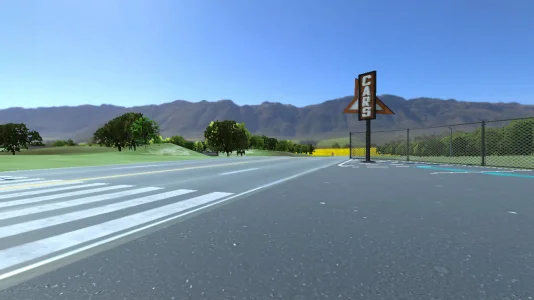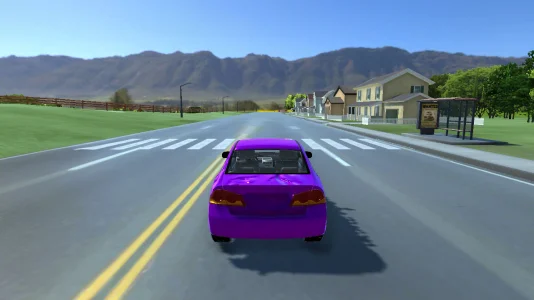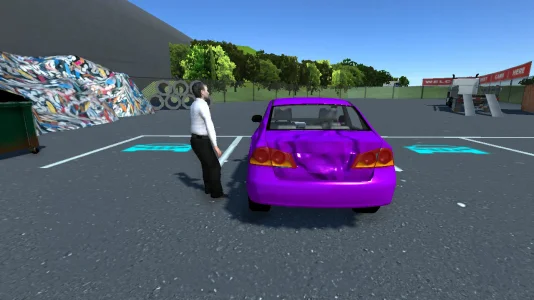Car Trader Simulator
Screenshots
Content
An In-depth Analysis of Car Trader Simulator 2025
Car Trader Simulator 2025 represents a significant entry into the mobile simulation genre, offering players a comprehensive business management experience centered on the automotive trade. This title, developed by GamesEZ, is designed as a single-player, offline-capable application for the Android platform, with accessibility extended to Windows PC through the Google Play Games client. The game challenges players to build a car dealership empire from the ground up, engaging with complex mechanics such as vehicle acquisition, detailed assessment, strategic renovation, and nuanced sales negotiation. Its core identity is a casual tycoon simulation, which is reflected in both its sophisticated management systems and its streamlined interface, tailored for a broad mobile audience.
Development and Technical Profile
Developer and Design Philosophy
The game is a product of GamesEZ, a development studio formally known as EZ Games, based in Ho Chi Minh City, Vietnam. Founded in 2020 by Robert Vu and Sylvie Hoang, the studio's portfolio shows a strong organizational focus on the casual and 'Idle' Tycoon simulation genres, with titles like Idle Workout Master and Idle Gym Life 3D! demonstrating their expertise. This background informs the design philosophy of Car Trader Simulator 2025, which implements deep simulation features within a simplified framework. While the game promises complex market navigation and staff management, its execution leans towards a 'Tycoon Lite' experience, making its intricate systems more accessible than those found in hardcore PC simulation titles.
Core Specifications and Release Information
Car Trader Simulator 2025 is officially categorized as a Simulation game, with sub-genres including Vehicle Management and Car Dealing. It operates as a single-player experience and, critically for mobile users, possesses full offline functionality. The game's official package identifier on the Android platform is com.gametov.carforsale.1. Development appears to be active, as evidenced by a frequent release cadence; the version history shows progression from V8.0 in July 2025 to the latest confirmed version, V9.1, which was updated on October 7, 2025. This active update schedule is crucial, given the persistent performance and stability concerns reported by the game's global user base of over 5 million players.
Gameplay Mechanics and Core Loop
The Entrepreneurial Profit Cycle
The fundamental gameplay loop in Car Trader Simulator 2025 is structured around an economic cycle designed to generate profit and facilitate business expansion. This process requires strategic decision-making at every stage, from identifying undervalued assets to closing profitable sales. The core profit cycle involves a clear, iterative progression:
- Acquisition: Players must source vehicles from various in-game locations, including residential areas, dedicated car markets, ports, and competitive auctions. The key to this stage is identifying undervalued or damaged cars, a skill referred to as sniffing out deals. However, recurring user feedback indicates a demand for an increased variety of available cars across all price tiers in these zones.
- Assessment: After acquiring a vehicle, a detailed inspection is necessary to determine its true market value and the required investment for repairs. This assessment phase is critical for calculating potential profit margins and avoiding poor investments.
- Renovation and Enhancement: Profits are strategically reinvested into the business. This includes hiring skilled mechanics to perform repairs and upgrades that enhance a vehicle's value. Players can also improve their showroom to increase the appeal of their inventory and justify higher asking prices. Community requests highlight a desire for more extensive customization options within the Car Repair Shop environment.
- Sales Negotiation: The final stage involves engaging with potential buyers. Strategic negotiation is essential to secure the most profitable deals, demanding a careful balance between maximizing profit and ensuring a quick turnover of inventory.
Advanced Dealer Management Systems
Beyond the core buy-and-sell loop, the game incorporates detailed management layers characteristic of the Tycoon genre. Players must manage a growing inventory and continuously upgrade their business infrastructure, such as the showroom, to handle a larger volume of high-value automobiles. Personnel management is another significant component, requiring players to hire employees like mechanics and drivers, who vary in experience, specialization, and employment cost. The game features advanced logistical functions, including the ability to plan delivery and task routes for staff across the map, adding a layer of strategic complexity. Success also depends on monitoring dynamic market fluctuations, customer preferences, and in-game news events to adjust inventory and advertising strategies effectively.
Game Modes and Player Progression
Single-Player Tycoon Campaign
The primary structure of Car Trader Simulator 2025 is a single, persistent Tycoon simulation campaign. The player begins as an enthusiast with minimal resources and must progress through sequential milestones to build a successful car business empire. This progression involves acquiring initial inventory, negotiating sales, and reinvesting profits into showroom upgrades and professional staff. The ultimate goal is to unlock achievements, earn rewards, and climb the simulated ranks to become a car trading mogul. This guided experience introduces mechanics gradually, with some related simulation titles offering branching narratives based on moral choices, such as following a "Lawful" or a more illicit "Mafia" business path.
Career Progression vs. Open-Ended Sandbox Play
The described progression serves as the game's Career Mode. Given the nature of tycoon simulation games and references to "unlimited possibilities" for business growth, it is highly probable that the game transitions into an open-ended Sandbox or Free Play state upon completion of the initial campaign missions. In this state, the focus shifts entirely to maximizing wealth and managing the business without pre-defined objectives, allowing for endless accumulation and expansion. The game's confirmed offline playability makes it exceptionally well-suited for long-term strategic engagement during periods of travel or commuting where internet access is unreliable.
System Requirements and Performance Analysis
Specifications for Android Devices
Running Car Trader Simulator 2025 effectively via an APK requires attention to device specifications due to its resource-intensive 3D simulation engine. The minimum supported operating system is Android 9 (Pie). The application package (APK) size is substantial, ranging from 218.5 MB to 250.5 MB, with a post-installation footprint that can easily exceed 500 MB. While official RAM requirements are not listed, the game's detailed graphics and frequent user reports of crashes resulting in progress loss necessitate higher-end hardware for stable operation. It is strongly recommended that devices possess at least 4 GB of RAM and a mid-tier Quad-Core 64-bit CPU to mitigate the risk of memory leaks and application instability that can lead to data corruption.
Critical Stability Concerns and Data Integrity
The most significant technical flaw reported by the community is the game's critical instability. A pervasive bug in the auto-save system frequently causes the application to reset a player's progress, money, and vehicle inventory following a crash or unexpected closure. This failure of the save system severely undermines the long-term investment required to engage with the game's complex management mechanics. The community has urgently requested the implementation of a manual save option to address this data integrity crisis. The technical issue likely stems from the application state not being reliably written to storage before a crash occurs, reverting the user to the last stable save point and erasing hours of effort.
Monetization and In-App Purchase Structure
Car Trader Simulator 2025 utilizes a hybrid Free-to-Play (F2P) monetization model that includes both advertisements and in-app purchases (IAPs). Ads are deployed in two primary formats: optional incentivized videos that provide players with in-game rewards, and forced interstitial ads that interrupt gameplay. While the game is fully playable without monetary investment, the F2P path requires a significant time commitment and tolerance for ad exposure. The IAPs likely serve to accelerate progress through cash injections, time skips, or the unlocking of premium content. However, the established data integrity risk poses a substantial financial concern for players. Investing real money into a game where purchased assets can be arbitrarily lost due to a technical flaw is a high-risk proposition until the developer addresses the save stability issue.
Conclusion and Player Recommendations
Car Trader Simulator 2025 presents a compelling and aesthetically pleasing simulation experience, with its primary strengths lying in an addictive economic loop and high-quality stylized graphics. Its status as a fully offline experience further enhances its appeal for mobile gamers. However, these strengths are critically undermined by a severe, systemic weakness: the unreliable auto-save system that frequently results in the complete loss of player progress. This technical flaw compromises the entire player investment experience, from time spent grinding to money spent on IAPs.
The ideal player for this title is a casual tycoon enthusiast who enjoys strategic management but is tolerant of a high degree of operational risk. Until developer GamesEZ deploys a verifiable fix for the progress reset issue, players should consider their investment in the game to be highly volatile. While the core concept is inherently engaging, the unresolved stability flaw represents a fundamental barrier to a fully rewarding and reliable simulation experience.
An Analytical Guide to Car Trader Simulator
Car Trader Simulator presents a single-player tycoon simulation experience centered on the automotive trade. The player assumes the role of an aspiring entrepreneur who must build a successful car business from minimal resources. Gameplay revolves around strategic decision-making, financial management, and logistical optimization. The primary objective tasks the player with navigating a dynamic market to achieve the status of a car trading mogul through systematic business expansion and wealth accumulation.
Core Gameplay Mechanics and Progression
The Economic Cycle of Car Trading
The fundamental gameplay loop constitutes an economic cycle of vehicle acquisition, assessment, renovation, and sales. Player progression directly correlates with the mastery of this four-stage process. The player first acquires vehicles from diverse in-game locations, including residential areas, car markets, ports, and auctions. This acquisition phase requires players to identify undervalued or damaged assets to maximize potential profit margins.
Following acquisition, the player performs a detailed inspection of each vehicle. This assessment mechanic is critical for determining a car's market value and identifying the necessary investment for repairs and enhancements. Strategic reinvestment of profits facilitates the renovation stage. Players hire skilled mechanics who execute repairs and upgrades, which increases the vehicle's appeal and sale price. The final stage involves sales negotiation, where the player engages with potential buyers to secure the most profitable transaction. This system demands an astute calculation of profit against the speed of inventory turnover.
Business Management and Expansion
Beyond individual vehicle transactions, the game incorporates detailed management layers characteristic of the tycoon genre. Players manage a growing inventory of cars and must continually reinvest capital into business infrastructure. Upgrades to the showroom and garage increase the capacity for high-value vehicles and enhance the business's appeal to customers. Personnel management represents a significant component of long-term strategy. The player hires employees, such as mechanics and drivers, who possess varying levels of experience and specialized skills at different employment costs.
Strategic staff selection directly accelerates business growth and ensures repair quality. The simulation also features a dynamic market system. Players must monitor market trends, shifting customer preferences, and in-game news events. Effective business management requires the player to adjust inventory, advertising, and sales strategies to capitalize on these market fluctuations and attract more buyers.
Navigating the Game World and Controls
The Single-Player Campaign Structure
Car Trader Simulator is structured as an entrepreneurial campaign that guides the player through sequential milestones. Progression begins with acquiring initial inventory and negotiating the first sales. Success allows the player to reinvest profits into showroom upgrades and hiring staff. The campaign offers a guided experience, introducing complex mechanics gradually. Narrative elements may present the player with choices that shape their business path, such as adhering to a lawful route or engaging in higher-risk illicit activities. Upon completion of the primary campaign objectives, the game likely transitions into an open-ended sandbox state, where the focus shifts entirely to wealth maximization and endless business expansion without predefined goals.
Player Interaction and Control Scheme
The game's control interface utilizes touch input designed for mobile platforms. Primary interactions rely on tap and point gestures, which facilitate navigation through extensive management menus, the initiation of repairs, and the execution of negotiations. For interaction within the 3D environment, the game employs standard mobile gesture controls. Players use swiping or dragging motions to rotate the camera during vehicle inspections. A pinch-to-zoom gesture allows for closer examination of vehicle details. The game also contains an advanced logistical layer, enabling players to plan routes for staff across a strategic map. This feature likely uses a press-and-hold input to initiate a path-drawing mode, adding tactical depth to personnel management.
Foundational Strategies for New Players
Initiating Your Car Trading Career
New players begin their career with limited seed money, which necessitates careful capital management. The game initiates a mandatory tutorial that guides the user through foundational mechanics, including the first vehicle acquisition and sale. Early progression relies on an iterative loop of sourcing low-cost vehicles, performing essential repairs, and selling them to generate immediate cash flow. Players must reinvest these initial profits to systematically expand the business. This expansion unlocks access to more profitable acquisition channels, such as vehicle auctions and port imports, which are essential for long-term growth.
Key Tips for Sustainable Growth
Success in Car Trader Simulator requires a strategic approach from the outset. Players can follow several key principles to build a stable and profitable enterprise.
- Prioritize Infrastructure Over Inventory: Early profits provide greater long-term returns when invested in upgrading the showroom and garage capacity rather than simply acquiring more low-tier cars. Enhanced infrastructure supports higher turnover and the management of more valuable vehicles.
- Master Negotiation Skills: The negotiation phase ultimately determines the profit margin on each sale. New players must learn to assess buyer resistance and propose deals that maximize financial return without losing the transaction.
- Manage Financial Risk: Players should avoid high-risk ventures, such as major auctions, until they establish a substantial cash reserve. This financial buffer is necessary to absorb potential losses from poor investments and maintain operational stability.
- Follow a Guided Development Path: If the campaign presents moral choices, adhering to a "Lawful" path offers a lower-risk strategy for beginners. This approach typically fosters a better long-term business reputation compared to more volatile alternative routes.
Advanced Techniques for Empire Building
Mastering Market Dynamics and Negotiation
Advanced players transition from simple vehicle flipping to dominating the automotive market. A key negotiation tactic is the art of anchoring. A player should begin sales discussions by setting an asking price slightly above the vehicle's maximum justifiable value. This action psychologically anchors the buyer to a higher price point, often resulting in a more lucrative final sale price even after making concessions. Furthermore, players must dedicate resources to monitoring in-game market reports to exploit trends. Adjusting inventory to match shifting customer demand ensures that high-value, desirable vehicles are consistently available for sale.
Optimizing Logistics and Personnel
As the business expands, efficient resource allocation becomes paramount. Players must hire staff based on specific specializations and experience levels to increase operational efficiency. A master mechanic, for example, can significantly reduce vehicle repair times, which directly increases cash flow. A crucial optimization technique involves using trailers as a form of non-showroom inventory storage. Purchasing larger trailers for drivers creates overflow capacity, allowing players to strategically swap cars between mobile storage and the physical garage to manage a larger inventory without immediate, costly infrastructure expansion. The strategic map feature allows players to plan efficient routes for staff, minimizing travel time and maximizing personnel utilization.
Managing Technical Instability
A critical advanced strategy in Car Trader Simulator involves mitigating a core technical flaw related to its save system. The game's auto-save function is prone to failure after application crashes, which can result in a catastrophic loss of money, inventory, and progress. To manage this risk, players must treat every major transaction as a save checkpoint. After selling a valuable car or winning a major auction, the player should immediately exit the application through the in-game menu. This action increases the probability of triggering a stable save cycle. Maintaining a large liquid cash reserve also functions as a crucial buffer against the financial losses caused by an unexpected progress reset.




